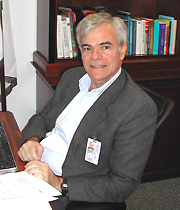BUILDING BRIDGES TO SCIENTIFIC INDEPENDENCE
 |
|
Michael
Gottesman
|
There are 3,850 fellows at NIH—900 IRTAs and CRTAs, 1,800 visiting fellows, 50 special volunteers with private funding, 800 research fellows, and 300 clinical fellows. All are at NIH to get advanced training in biomedical research that will enable them to make important contributions when they leave, many as independent researchers.
Although our "Guide to Mentoring and Training in the Intramural Research Program" clearly states that "As the fellow matures and prepares to define a scientific niche, a good mentor knows when to step back and allow more independence," precisely how to encourage and support that independence and the career transition that follows is not always obvious.
Two recent programs—one called the "Pathway to Independence Award" that is just underway, and the other a new career track for clinical investigators that is a work in progress—provide concrete ways for fellows to build bridges to independent research careers.
Pathway to Independence
The Pathway to Independence Award is intended to support one to two years of independent research activities within a mentored postdoctoral program and provides up to $249,000 total support per award for three years in an independent research program.
Also known as the K99/R00, this award is both a career development award (K series) and an R award to the grantee academic site (including complete negotiated overhead) when the scientist takes up an academic position. It is therefore quite attractive to both the scientist recipients and the awardee institutions and should serve the purpose of supporting outstanding independent research and encouraging faculty appointments.
The Pathway to Independence award is also meant to accelerate the rate at which postdocs achieve independence. Because the intramural program has a limit of five years total postdoctoral experience, applicants who are intramural postdocs may not have exceeded four years of postdoctoral training. They can, however, extend the postdoc for up to two years if an award is received.
The first review round for this award has been completed, and the awardees have been announced. Our intramural postdocs are clearly competitive for these awards: 4 of 44 intramural applicants and 60 of 962 extramural applicants received awards.
The new application deadlines this year are February 12, June 12, and October 12. All intramural postdocs who have had four years or less of postdoc experience are strongly urged to apply as described at the website.
The application process is supported by mentoring from appropriate supervisors and/or formal training within each institute and center, so that all fellows who apply, whether or not they are successful, will have the valuable experience of writing a research proposal that is critically reviewed. The award is open to all of our fellows, including visiting fellows and clinical fellows, but not to contractors who, by definition, are not supervised by NIH employees.
Clinical Investigator Career Track
We are well aware that many clinical fellows are not ready for full independence within five years of starting their fellowships and that additional opportunities for graduated independence in a career track for physician-scientists are needed at NIH.
Clinical and translational researchers at extramural sites can apply for various K awards, including K08 (mentored laboratory research) and K23 (mentored clinical research) awards and receive status at their institutions based on receipt of these awards. There has been no equivalent recognition at NIH.
Based on recommendations of the 2004 Blue Ribbon Panel on Clinical Research at NIH, the Advisory Board for Clinical Research has endorsed a proposal to create an associate clinical investigator position at NIH for senior clinical fellows who, by virtue of a research plan and outstanding performance, compete successfully for this position.
It is expected that they will pursue clinical research of their own design in a mentored environment, frequently as part of a clinical research team. An equivalent position for physician-scientists interested in more laboratory-based or translational research is also under consideration. Graduates of this career track will be able to compete effectively for tenure-track positions in clinical research at NIH and elsewhere.
Although more vetting and discussion of the details of this proposal are needed, we hope to get such a pathway underway before the end of the calendar year.
More Bridges
In addition to these new programs, let me remind you of several other bridge awards available for NIH fellows, including K22 awards, the American Heart Association Scientist Development Grant, and the Burroughs Wellcome Fund Career Awards Program. For additional information, see this website.
These awards are quite competitive, and NIH postdocs win them on a regular basis; again, the application process itself is a useful training experience.
To improve training and accelerate the path to independence for our fellows are basic and ongoing NIH priorities. Our efforts in this arena will continue
Deputy Director for Intramural Research